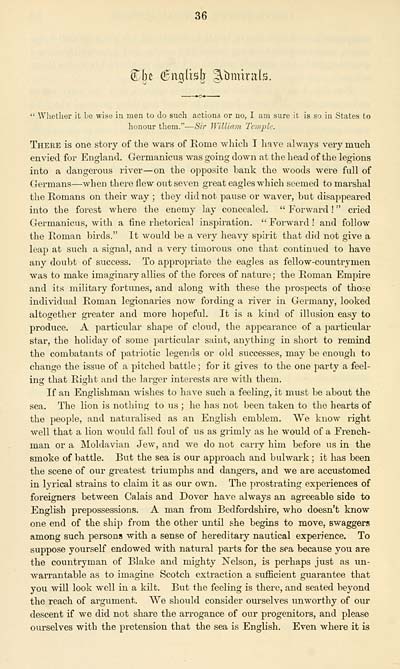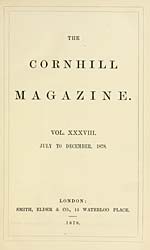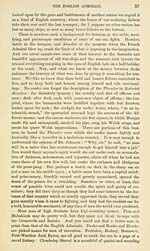Non-Fiction > Uncollected essays > Volumes 33-38, 1876-1878 - Cornhill magazine > Volume 38
(8) Page 36 - English Admirals
Download files
Complete book:
Individual page:
Thumbnail gallery: Grid view | List view

36
CJtt (SnqUsb - ^bmintls.
" Whether it be wise in men to do such actions or no, I am sure it is so in States to
honour them." — Sir William Tempi:.
There is one story of the wars of Rome which I have always very much
envied for England. Germanicus was going down at the head of the legions
into a dangerous river — on the opposite bank the woods were full of
Germans — when there flew out seven great eagles which seemed to marshal
the Romans on their way ; they did not pause or waver, but disappeared
into the forest where the enemy lay concealed. " Forward ! " cried
Germanicus, with a fine rhetorical inspiration. " Forward ! and follow
the Roman birds." It would be a very heavy spirit that did not give a
leap at such a signal, and a very timorous one that continued to have
any doubt of success. To appropriate the eagles as fellow-countrymen
was to make imaginary allies of the forces of nature ; the Roman Empire
and its military fortunes, and along with these the prospects of those
individual Roman legionaries now fording a river in Germany, looked
altogether greater and more hopeful. It is a kind of illusion easy to
produce. A particular shape of cloud, the appearance of a particular
star, the holiday of some particular saint, anything in short to remind
the combatants of patriotic legends or old successes, may be enough to
change the issue of a pitched battle ; for it gives to the one party a feel-
ing that Right and the larger interests are with them.
If an Englishman wishes to have such a feeling, it must be about the
sea. The lion is nothing to us ; he has not been taken to the hearts of
the people, and naturalised as an English emblem. We know right
well that a lion would fall foul of us as grimly as he would of a French-
man or a Moldavian Jew, and we do not carry him before us in the
smoke of battle. But the sea is our approach and bulwark ; it has been
the scene of our greatest triumphs and dangers, and we are accustomed
in lyrical strains to claim it as our own. The prostrating experiences of
foreigners between Calais and Dover have always an agreeable side to
English prepossessions. A man from Bedfordshire, who doesn't know
one end of the ship from the other until she begins to move, swaggers
among such persons with a sense of hereditary nautical experience. To
suppose yourself endowed with natural parts for the sea because you are
the countryman of Blake and mighty Nelson, is perhaps just as un-
warrantable as to imagine Scotch extraction a sufficient guarantee that
you will look well in a kilt. But the feeling is there, and seated beyond
the reach of argument. We should consider ourselves unworthy of our
descent if we did not share the arrogance of our progenitors, and please
ourselves with the pretension that the sea is English. Even where it is
CJtt (SnqUsb - ^bmintls.
" Whether it be wise in men to do such actions or no, I am sure it is so in States to
honour them." — Sir William Tempi:.
There is one story of the wars of Rome which I have always very much
envied for England. Germanicus was going down at the head of the legions
into a dangerous river — on the opposite bank the woods were full of
Germans — when there flew out seven great eagles which seemed to marshal
the Romans on their way ; they did not pause or waver, but disappeared
into the forest where the enemy lay concealed. " Forward ! " cried
Germanicus, with a fine rhetorical inspiration. " Forward ! and follow
the Roman birds." It would be a very heavy spirit that did not give a
leap at such a signal, and a very timorous one that continued to have
any doubt of success. To appropriate the eagles as fellow-countrymen
was to make imaginary allies of the forces of nature ; the Roman Empire
and its military fortunes, and along with these the prospects of those
individual Roman legionaries now fording a river in Germany, looked
altogether greater and more hopeful. It is a kind of illusion easy to
produce. A particular shape of cloud, the appearance of a particular
star, the holiday of some particular saint, anything in short to remind
the combatants of patriotic legends or old successes, may be enough to
change the issue of a pitched battle ; for it gives to the one party a feel-
ing that Right and the larger interests are with them.
If an Englishman wishes to have such a feeling, it must be about the
sea. The lion is nothing to us ; he has not been taken to the hearts of
the people, and naturalised as an English emblem. We know right
well that a lion would fall foul of us as grimly as he would of a French-
man or a Moldavian Jew, and we do not carry him before us in the
smoke of battle. But the sea is our approach and bulwark ; it has been
the scene of our greatest triumphs and dangers, and we are accustomed
in lyrical strains to claim it as our own. The prostrating experiences of
foreigners between Calais and Dover have always an agreeable side to
English prepossessions. A man from Bedfordshire, who doesn't know
one end of the ship from the other until she begins to move, swaggers
among such persons with a sense of hereditary nautical experience. To
suppose yourself endowed with natural parts for the sea because you are
the countryman of Blake and mighty Nelson, is perhaps just as un-
warrantable as to imagine Scotch extraction a sufficient guarantee that
you will look well in a kilt. But the feeling is there, and seated beyond
the reach of argument. We should consider ourselves unworthy of our
descent if we did not share the arrogance of our progenitors, and please
ourselves with the pretension that the sea is English. Even where it is
Set display mode to: Large image | Transcription
Images and transcriptions on this page, including medium image downloads, may be used under the Creative Commons Attribution 4.0 International Licence unless otherwise stated. ![]()
| Early editions of Robert Louis Stevenson > Non-Fiction > Uncollected essays > Cornhill magazine > Volume 38 > (8) Page 36 - English Admirals |
|---|
| Permanent URL | https://digital.nls.uk/78694450 |
|---|---|
| Subject / content: |
Admirals English Heroes Seas Essays |
|---|---|
| Person / organisation: |
Stevenson, Robert Louis, 1850-1894 [Author] |
| Dates / events: |
1878 [Date/event in text] |
|---|---|
| Subject / content: |
Volumes (documents by form) |
| Person / organisation: |
Stevenson, Robert Louis, 1850-1894 [Contributor] |
| Form / genre: |
Written and printed matter > Periodicals |
|---|---|
| Dates / events: |
1860-1975 [Date published] |
| Places: |
Europe >
United Kingdom >
England >
Greater London >
London
(inhabited place) [Place published] |
| Subject / content: |
Fiction Journals (periodicals) Short stories |
| Person / organisation: |
Smith, Elder, and Co. [Publisher] |
| Description | Essays and reviews from contemporary magazines and journals (some of which are republished in the collections). 'Will o' the Mill', from Volume 37 of the 'Cornhill Magazine', is a short story or fable. |
|---|
| Person / organisation: |
Stevenson, Robert Louis, 1850-1894 [Author] |
|---|



